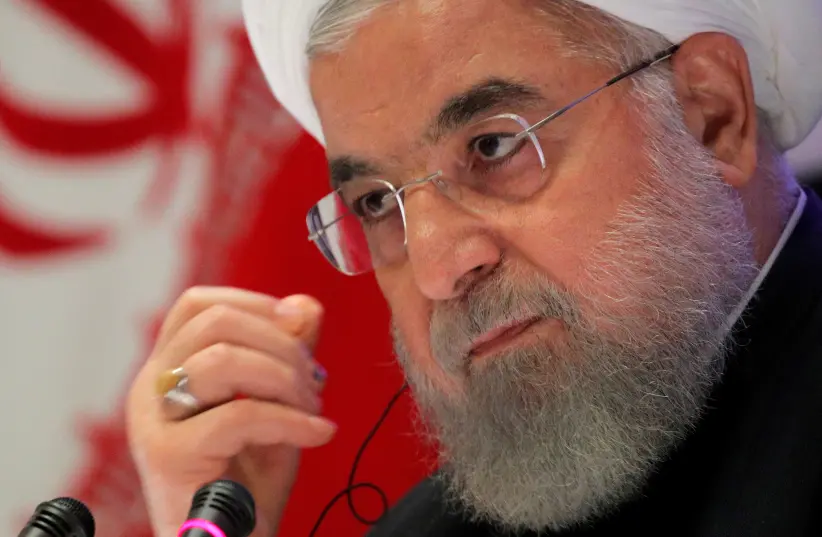The timing question is whether the US wants to try to strike a deal with current Iranian President Hassan Rouhani before the June elections.
The latest bizarre round of US-Iran non-negotiation through public statements around each other is about one thing: timing.
The timing question is whether the US wants to try to strike a deal with current Iranian President Hassan Rouhani before the June elections or more directly with Supreme Leader Ayatollah Ali Khamenei and his camp after elections.
Late Monday, Politico reported a third US attempt to draw the Iranians into negotiations over returning to the 2015 nuclear deal along with follow-on negotiations to a longer and stronger deal.
The Islamic Republic rejected this offer within hours as it had rejected the Biden administration’s prior two attempts: one of which had been public and one quieter and more informal.
What is strange about the inability of the two sides to reach an understanding is that both sides have made it clear that they want to reach a situation where each side is complying again with the 2015 deal.
Also, both sides have signaled they are willing to compromise in a synchronized fashion.
Israel and the Saudis are happy that no deal has happened, but why are Washington and Tehran at loggerheads for nearly 10 weeks now about who makes the first concession if they want the same basic result?
Some top officials in the US, and certainly in Europe, have been desperate to return to the deal before the June elections.
In their minds, it may be impossible to cut a deal with the Islamic Republic after June, when the “pragmatists” led by Rouhani may lose their last piece of influence, having been battered by hardliners closer to Khamenei in the last parliament elections.
Yet, until now, it seems a different school of thought has led the way in the Biden administration.
This other school of thought is that Rouhani has always been somewhat of a mirage for the hard-line Khamenei to hide behind to appear pragmatic.
Khamenei may be closer to the hard-liners and the next president may be less pragmatic than Rouhani. But some believe it is better to deal with the regime’s true face when cutting a deal.
Further, some in Washington clearly believe that the only way to get Khamenei to agree to add-ons to the nuclear deal – extending its nuclear limits beyond 2030, restricting ballistic missiles and limiting aggressive Iranian behavior in the region – is to not blink first.
According to this thinking, Iran believes that Biden is Obama 2.0 and will concede to its will sometime before the June elections, even if it is late in the game.
These Iranians would believe they have the upper-hand with Biden and that time is on their side.
Maybe the only way to change their mind would be to wait to cut a deal until after the June elections.
Only if Tehran starts to look at another full four years of sanctions if it does not make real concessions, might it suddenly become more willing to deal.
Iran’s June elections have probably been the main timing weighing on the minds of Biden administration officials, but it is also interesting that the new offer came out only days after March 23.
Some Biden administration officials might have hoped for a clearer sign about who they might be contending with from Israel as they press forward with negotiations.
Prime Minister Benjamin Netanyahu has already publicly blasted any nuclear negotiations which do not lead to a complete surrender and end to Iran’s nuclear program – a non-starter in Washington.
In contrast, the US may have hoped that the three candidates to succeed him might keep their criticism more private and behind the scenes.
Yesh Atid and New Hope party leaders Yair Lapid and Gideon Sa’ar had both been clear that they objected to Netanyahu’s public criticism of the US over Iran and other issues.
Bennett was a less predictable quantity.
But he would not be expected to be able to give the US much more trouble than Netanyahu would give, and might be more modest as a new prime minister.
In terms of the actual offer from the US, it is interesting that Iranian officials went out of their way to reject stopping 20% uranium enrichment, but did not explicitly reject halting advanced centrifuge development.
This may be an opening from the Islamic Republic about how it sees different kinds of partial concessions and nuclear limits for partial sanctions relief.
Back in 2018-2019, there were discussions about partial sanctions relief or sanctions waivers for Iran to partially reduce its nuclear violations.
All of this can probably be solved once the US and Iran reach what they view as the right time period for a deal and possibly some informal understandings about what add-ons to a deal might look like.
In the meantime, Jerusalem will need to continue its dialogue with Biden officials about which add-ons to the nuclear deal it views as most imperative.
The third rejection by Iran in no ways means that a deal has receded from the picture.
As long as that is in the picture, Israel will want to influence that deal’s timing and terms to the greatest extent possible.
 Eurasia Press & News
Eurasia Press & News




